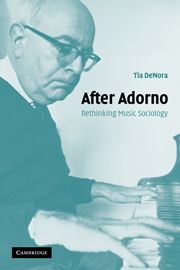Book contents
- Frontmatter
- Contents
- List of figures
- List of music examples
- Preface: a two part invention
- Acknowledgements
- A note on background reading
- 1 Adorno, ‘defended against his devotees’?
- 2 New methods and classic concerns
- 3 Music as cognition
- 4 How does music ‘channel’ emotion?
- 5 Music and ‘control’
- 6 After Adorno: rethinking music sociology
- Bibliography
- Index
Preface: a two part invention
Published online by Cambridge University Press: 22 September 2009
- Frontmatter
- Contents
- List of figures
- List of music examples
- Preface: a two part invention
- Acknowledgements
- A note on background reading
- 1 Adorno, ‘defended against his devotees’?
- 2 New methods and classic concerns
- 3 Music as cognition
- 4 How does music ‘channel’ emotion?
- 5 Music and ‘control’
- 6 After Adorno: rethinking music sociology
- Bibliography
- Index
Summary
In the early 1980s, I attended a public lecture given by a prominent American sociologist now deceased. We were introduced and conversed briefly. He enquired politely about my academic aspirations and I described my interest in Adorno's socio-musical work. (My undergraduate thesis had been on the Philosophy of Modern Music (see DeNora 1986a) and I counted myself as one of Adorno's most ardent devotees.) To the best of my recollection, this sociologist said, ‘and what will you do when you finish with Adorno, for finish with him you will?’
His words stung at the time. But, by the mid-1980s, in the second year of the Sociology Ph.D. programme at University of California, San Diego (UCSD) I had – or so I then assumed – ‘finished’ with Adorno. Tuning in to a curriculum that emphasised socio-linguistics, ethnomethodology, and action theory, and reading Becker's Art Worlds (then something of a watershed), I became less interested in what I began to see as ‘impossible’ questions about music's link to consciousness and domination. I began to work on the question of musical identity and value, viewed through the prism of reputation in-the-making. As a case-in-point I chose to focus on Beethoven and his musical world in late eighteenth-century Vienna. At that point, for me, Adorno came to seem not only remote but – worse – empirically suspect.
- Type
- Chapter
- Information
- After AdornoRethinking Music Sociology, pp. xi - xiiiPublisher: Cambridge University PressPrint publication year: 2003



